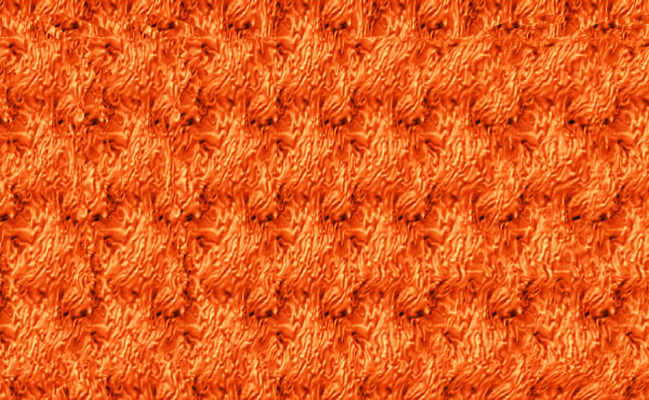Do you remember those Magic Eye autostereograms? A hidden 3D image would swim into view on a 2D pattern once you had learnt to diverge your eyes’ normal parallax focus. I found I could see the image when I stopped concentrating; I would relax my gaze and suddenly there it was.
Yet I can’t slip nearly so easily into my work. I find the craft of writing drearily effortful, and both yearn for and resent the fluent, ecstatic altered states of consciousness that the ‘writering’ industry holds up as peak experiences. Leaps of imagination. Synaptic flashes of intellectual connection. The feeling that a story is ‘telling itself’, or that characters show up, fully formed, to narrate their own plots.
Readers, too, praise an author’s expression of transcendence. The writing is ‘immersive’ or ‘gripping’; it ‘transports’ the reader to the story-world, or into the characters’ minds.
Such rhetoric reminds me of the spiritualist practice of automatic writing; of religious communion with gods, saints or ancestors. Or even Socrates’ daimonion (a ‘divine something’): an inner moral voice that would pipe up to counsel him. By contrast, I feel like a fallen angel stripped of my wings. Or Eve, exiled from the Garden of Eden.
Some writers report finding inspiration in liminal, dreamlike states. Introducing the second edition of her novel Frankenstein in 1823, Mary Shelley recalled: ‘When I placed my head on my pillow, I did not sleep, nor could I be said to think. My imagination, unbidden, possessed and guided me, gifting the successive images that arose in my mind with a vividness far beyond the usual bounds of reverie.’
Then there is what Hungarian psychologist Mihaly Csikszentmihalyi has conceptualised as ‘flow’: a state of focused attention that radically diminishes your subjective perception of time, effort and – most importantly – self-consciousness. Journalling and free-association exercises are designed to induce a flow state, sometimes called ‘the writing trance’. Perhaps you have heard of ‘morning pages’, a daily writing practice popularised by poet, playwright and creativity pedagogue Julia Cameron.
Such exercises presuppose that the memories, ideas, images and mental connections needed to produce excellent writing are esoteric, ‘hidden’ from the writer’s everyday self. In his book On Becoming a Novelist, pioneering creative writing lecturer John Gardner refers to ‘the mysterious centre of things, the secret room where dreams prowl’. Rudyard Kipling advised, ‘When your Daemon is in charge, do not try to think consciously. Drift, wait, and obey.’ Similarly, bell hooks writes in a 1998 essay, ‘Voices and Visions’, of a ‘divine spirit’ that grips her pen in ‘a moment of pure mystery. It’s a visitation of the sacred that I cannot call forth at will. I can only hope that it will come.’
Flow feels transcendent, even supernatural, because it’s a cognitive gear-shift from what Daniel Kahneman has called ‘slow thinking’ – logical, deliberative, socially grounded – to ‘fast thinking’ – uncritical, emotional, instinctive. ‘Paradoxically,’ writes Csikszentmihalyi in his 1997 book Creativity, ‘the self expands through acts of self-forgetfulness.’
Nonetheless, it still is the self.
Introducing their 2015 essay collection The Racial Imaginary, Beth Loffreda and Claudia Rankine point out that ‘our imaginations are creatures as limited as we ourselves are. They are not some special, uninfiltrated realm that transcends the messy realities of our lives and minds.’
It’s comforting that I can relax into inspiration’s elusiveness, without needing to approach it as a supplicant. As Loffreda and Rankine point out, the essential strangeness of the self ‘doesn’t mean we must make a fetish of that mysteriousness’:
For that unknowable portion of the human mind is also a domain of culture – a place crossed up by culture and history, where the conditions into which we were born have had their effect.
Such conditions include the reasons why writers drink and use drugs. It’s troubling to aestheticise the ruins of talented people’s lives, as if to suggest writers produce their most compelling work when they unleash ‘inner demons’ on the page in altered states accessed by substance use.
For instance, essayist Olivia Laing suggests that Patricia Highsmith’s raging alcoholism passed ‘fluidly’ into her most famous character: ‘Tom Ripley is not always a heavy drinker but he shares with the full-blown alcoholic his paranoia, his guilt and self-hatred; his need to obliterate or escape his painfully empty, flimsy self.’
Altered states aren’t only escapism or therapy; they also represent active problem-solving in a problematic world. For instance, the ‘Tetris effect’ is a well-known neuroscientific phenomenon in which people who have been repeatedly struggling with an activity or problem during the day re-enact and solve it as they fall asleep.
After spending hours wrestling with this column, paying despairing witness as it stubbornly refused to take shape, I gave up and went to bed. As I waited for sleep to claim me, an idea swam into focus. Why not begin the column with the metaphor of the Magic Eye?
Read the rest of Overland 230
If you enjoyed this column, buy the issue




